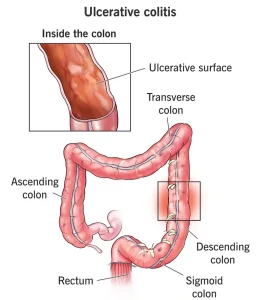Overview
Ulcerative colitis is a chronic inflammatory bowel disease that causes inflammation and ulcers in the inner lining of the large intestine (colon) and rectum. The condition usually develops gradually and can have periods of flare-ups followed by remission. Ulcerative colitis affects digestive function and can significantly impact quality of life, but with proper management, many people are able to control symptoms and lead active lives.
Symptoms
Symptoms of ulcerative colitis can vary depending on the severity of inflammation and the part of the colon affected. Common symptoms include:
-
Persistent diarrhea, often with blood or mucus
-
Abdominal pain and cramping
-
Urgency to have a bowel movement
-
Rectal bleeding
-
Fatigue
-
Unintended weight loss
-
Reduced appetite
In severe cases, symptoms may include fever, dehydration, and severe abdominal pain.
Causes
The exact cause of ulcerative colitis is not fully understood. It is believed to result from an abnormal immune response in which the immune system mistakenly attacks the lining of the colon. Factors that may contribute include genetic predisposition, immune system dysfunction, and environmental triggers. Diet and stress do not cause ulcerative colitis, but they may worsen symptoms during flare-ups.
Risk factors
Certain factors may increase the likelihood of developing ulcerative colitis:
-
Family history of inflammatory bowel disease
-
Age, with most diagnoses occurring before the age of 30, though it can occur at any age
-
Ethnic background, with higher prevalence in certain populations
-
Use of nonsteroidal anti-inflammatory drugs, which may aggravate symptoms
Complications
If not properly managed, ulcerative colitis can lead to serious complications, such as:
-
Severe bleeding
-
Colon perforation
-
Dehydration and electrolyte imbalance
-
Increased risk of colon cancer, especially with long-standing disease
-
Inflammation in other parts of the body, including joints, skin, and eyes
-
Toxic megacolon, a rare but life-threatening condition
Prevention
There is no known way to prevent ulcerative colitis, as the exact cause remains unclear. However, certain measures may help reduce flare-ups and support overall digestive health:
-
Following a balanced diet tailored to individual tolerance
-
Managing stress through relaxation techniques
-
Avoiding foods that trigger symptoms during active disease
-
Adhering to prescribed medical treatment and regular follow-ups
-
Avoiding smoking and unnecessary use of medications that irritate the gut
Early diagnosis and consistent treatment are essential to managing ulcerative colitis effectively and reducing the risk of complications.
Advertisement

